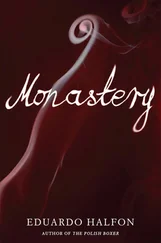Eduardo Halfon - The Polish Boxer
Здесь есть возможность читать онлайн «Eduardo Halfon - The Polish Boxer» весь текст электронной книги совершенно бесплатно (целиком полную версию без сокращений). В некоторых случаях можно слушать аудио, скачать через торрент в формате fb2 и присутствует краткое содержание. Год выпуска: 2012, Издательство: Bellevue Literary Press, Жанр: Современная проза, на английском языке. Описание произведения, (предисловие) а так же отзывы посетителей доступны на портале библиотеки ЛибКат.
- Название:The Polish Boxer
- Автор:
- Издательство:Bellevue Literary Press
- Жанр:
- Год:2012
- ISBN:нет данных
- Рейтинг книги:4 / 5. Голосов: 1
-
Избранное:Добавить в избранное
- Отзывы:
-
Ваша оценка:
- 80
- 1
- 2
- 3
- 4
- 5
The Polish Boxer: краткое содержание, описание и аннотация
Предлагаем к чтению аннотацию, описание, краткое содержание или предисловие (зависит от того, что написал сам автор книги «The Polish Boxer»). Если вы не нашли необходимую информацию о книге — напишите в комментариях, мы постараемся отыскать её.
marks the debut of a major new Latin American voice in English.
The Polish Boxer — читать онлайн бесплатно полную книгу (весь текст) целиком
Ниже представлен текст книги, разбитый по страницам. Система сохранения места последней прочитанной страницы, позволяет с удобством читать онлайн бесплатно книгу «The Polish Boxer», без необходимости каждый раз заново искать на чём Вы остановились. Поставьте закладку, и сможете в любой момент перейти на страницу, на которой закончили чтение.
Интервал:
Закладка:
Smiling strangely again, for the first time in two days Joe Krupp asked to speak, said that humor is everything, that humor is our salvation, that humor is mankind’s greatest blessing — which sounded to me like a quote, but I didn’t want to interrupt him — and then, with his languid Mark Twain voice, he started telling jokes. All kinds of jokes. For nearly half an hour. I think I might have been the only person who understood straight away where he was heading, or maybe I didn’t understand at all.
And as we’re in a golf club, said Joe Krupp to the group of confused intellectuals, well, that’s where I’ll finish. All right. One day a man walks into the women’s bathroom at a private golf club, accidentally, of course, and when he gets out of the shower he realizes that all his clothes are gone. Quite a fix, Joe Krupp said slowly, as though he himself were trying to remember or invent the punch line. Then, he continued after a pause, the man hears some women’s voices and puts a towel round his head to hide his face, but remaining otherwise completely naked. I could have sworn that while he was talking, the sky blue gaze of the old man settled on me, as though there were no one else in that huge cold conference room. And so when the man tries to run out of the bathroom, he bumps into the three women, who are shocked at first but then start looking him over closely, examining him, as it were. Joe Krupp laughed a devilish little laugh, with that mischievousness that only old age can absolve. That man isn’t my husband, says the first. That man isn’t my husband either, says the second. That man, says the third, isn’t even a member of this club.
Epistrophy
The first time I heard Milan Rakić play was a few years ago in the ruins of San José el Viejo. A pigeon had landed in its nest way up in the vaulted roof, directly above the Serbian pianist, who played on as though the rejoicing of the hungry chicks and the courageous flapping of the pigeon’s wings were notes that had been set down in the score by Rachmaninoff himself.
I’d arrived in Antigua a little late, and there was Lía, waiting for me in the Café del Conde, ripping the cellophane off of a pack of cigarettes with her teeth, and an ice-cold beer on the table. As if afraid to sit down, I stood there explaining that a truckload of chickens had overturned on the highway, holding up traffic in both directions for hours, and she just kept looking at me with as much incredulity as she could muster, which was a lot. Well, we’ve missed the talk on neo-baroque Italian architecture, she said in a silky voice, looking at her watch. I know. And the Irish children’s choir, she added. I thought about telling her I wasn’t in the mood to listen to some pretentious guy talk about neo-baroque Italian architecture, or to witness the alleluias of a chorus of pale Irish kids, or to watch the spasmodic strutting of some Far Eastern dance company, or to submit myself to the cheap melodramas of Salvadorean theater, or to partake — begging the pardon of any hooligans in the stands — in any of the activities at the biannual festival of culture in Antigua, Guatemala. I just let out a sigh. Oh well, Lía said suddenly, maybe it’s for the best. And she half smiled. Come on, give me a kiss, she said, yanking down on my shirt. Her mouth tasted like a desert island.
It was dark already and we drank our beer in silence. There was a strange stone fish next to us, spitting water vertically, halfheartedly, as if gargling. Every now and then Lía would lift up her hand so I could take a drag on her cigarette. Oxygen administered by the loveliest of nurses. She said she’d already checked us into our room. The same one? I asked, and she smiled uneasily. The same one, Dudú. She’d been calling me Dudú ever since she’d spent some time in Salvador de Bahía, doing Capoeira, sunbathing naked or half-naked, and of course learning Portuguese. She came back with a nickname for me like I was some midfielder on the Brazilian soccer team, as well as with her pubis shaved smooth. It seems impossible to me, inconceivable even, to resist falling in love with someone whose name was Lía and who had come back from vacation with her pubis shaved smooth.
Over another beer, we talked about the decadence of youth, about counts who walled up their adversaries, about superstring theory (Lía might have been studying medicine, but she had a thing for quantum physics), about oral sex according to Tibetan Tantra and oral sex according to a Cor-tázar story. Seeing the time, she said there was a marimba concert at Panza Verde. I kissed her neck. Come on, Dudú, just for a bit, she said as she closed her eyes and lifted her chin slightly, offering me still more of her neck. I paid for the beers.
We walked over to Panza Verde, or Green Belly, a restaurant that flaunts that questionably noble nickname for the people of Antigua — for their growing as well as eating so many greens, I’d been told. The men were in jackets and ties, the women all dressed up in furs and jewels and magnificent evening gowns, almost all of them black (for our part, we were looking particularly swanky in leather sandals and old T-shirts). Someone, somewhere, was playing the marimba. Several ambassadors, with champagne and chortling potbellies, were chatting at the back. The members of an Austrian quartet, who Lía told me had been playing Mozart that morning, were sticking together around a table, fearful, I suppose, of getting separated and having to face alone the dangers of the Third World. The Venezuelan baritone could be heard bawling about politics and, like any good Venezuelan, clucking incessantly about Chávez. There were some Guatemalan poets, drunk already, telling jokes about queers and about Rigoberta Menchú. Charming, I whispered as we dodged perfumes and waved hello and made our way straight to the bar in search of two tequilas and a little privacy.
A dark-skinned girl asked us what kind of tequila. We’ve got all sorts, she concluded, smiling conspiratorially, as if to say comrades, we’ll die here together. Ándele, cried Lía, white tequila, the best you’ve got. And we toasted the dark-skinned girl. Another? she said, wiping down the bar with a filthy cloth. Her hands looked too small to me. Then they looked like two muddy starfish. Then like two sad, puffed-up tarantulas locked in a territorial contest neither was ever going to win. And raising our glasses once more, we toasted Lee Marvin (we’d seen The Killers recently, the second film to be based on the story by Hemingway, shot in 1964 and directed by Don Siegel, during the entire filming of which Mr. Marvin was utterly, beatifically drunk). Someone left a tray of canapés in front of us.
Look, over there, said Lía, and I followed her gaze. A guy with long hair was drinking red wine at the far end of the bar. On his own. As if forgotten amid all the chaos. Hold this, she said, giving me the lit cigarette as she stood up. Lía was like that. She loved rescuing frail little birds and stray dogs. Once, when she was a girl, for her kindheartedness, she’d gotten a bite taken out of her left thigh by a huge, dirty English sheepdog.
May I introduce Milan Rakić? Pleased to meet you, he said in impeccable Spanish, albeit with an unabashedly Argentinian lilt. I asked if he was Argentinian. Serbian, he said, but my girlfriend’s from Buenos Aires. Gde si bre čoveče, I declaimed. Hey, you know Serbian? he cried, giving me a slap on the back. Lía smiled. As if, I said — too many Kusturica films. Then I said I remembered having read something about a Serbian pianist in the festival program. Yours truly, he exclaimed, smiling and jerking his thumb at his chest. And have you already played? Lía asked. He lit a cigarette. Tomorrow, at midday, he said, sighing a nervous or possibly desperate lungful of smoke.
Читать дальшеИнтервал:
Закладка:
Похожие книги на «The Polish Boxer»
Представляем Вашему вниманию похожие книги на «The Polish Boxer» списком для выбора. Мы отобрали схожую по названию и смыслу литературу в надежде предоставить читателям больше вариантов отыскать новые, интересные, ещё непрочитанные произведения.
Обсуждение, отзывы о книге «The Polish Boxer» и просто собственные мнения читателей. Оставьте ваши комментарии, напишите, что Вы думаете о произведении, его смысле или главных героях. Укажите что конкретно понравилось, а что нет, и почему Вы так считаете.












